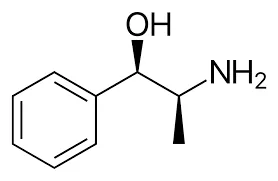
Phenylpropanolamine (PPA) is a compound that has historically been used in various over-the-counter medications, particularly as a decongestant and appetite suppressant. Its structure is similar to amphetamines, which has led to its use in products aimed at weight loss and cold relief. However, despite its initial popularity and efficacy in treating certain conditions, the safety profile of PPA has raised significant concerns, leading to its withdrawal from the market in many countries, including the United States.
One of the primary uses of phenylpropanolamine was as a decongestant. It works by constricting blood vessels in the nasal passages, thereby reducing swelling and congestion. This mechanism can provide relief for individuals suffering from allergies, sinus infections, or the common cold. The ability to alleviate nasal congestion made PPA a common ingredient in many cold and allergy medications, offering a quick solution for those seeking relief from respiratory discomfort.
In addition to its decongestant properties, PPA was also marketed as an appetite suppressant. This led to its inclusion in various weight loss products, particularly during the late 20th century when obesity rates began to rise significantly. The appeal of PPA as a weight loss aid stemmed from its stimulant-like effects, which could suppress appetite and increase energy expenditure. Many individuals turned to PPA-containing products in hopes of achieving their weight loss goals more easily.
However, the use of phenylpropanolamine became controversial due to serious health risks associated with its consumption. Research indicated that PPA was linked to an increased risk of hemorrhagic stroke, particularly among young women. This alarming finding prompted health authorities to reevaluate the safety of PPA-containing products. Reports suggested that even a single dose could elevate the risk of stroke significantly, leading to widespread concern about its use as a dietary supplement or medication.
As a result of these findings, the U.S. Food and Drug Administration (FDA) recommended that manufacturers discontinue the use of phenylpropanolamine in their products. This decision marked a significant shift in how PPA was viewed within the medical community and among consumers. The potential for life-threatening side effects overshadowed any benefits it may have provided as a decongestant or appetite suppressant.
Despite its withdrawal from many over-the-counter medications, there remains interest in understanding how compounds like phenylpropanolamine can impact health and fitness. While PPA may have been effective for some individuals seeking relief from congestion or weight loss, the associated risks serve as a reminder of the importance of safety when considering dietary supplements or medications.
For individuals focused on fitness and health, it is crucial to prioritize safety above all else. The allure of quick fixes or shortcuts to weight loss can often lead to dangerous choices. Instead of relying on potentially harmful substances like PPA, individuals are encouraged to adopt healthier lifestyle practices that promote sustainable weight management and overall well-being.
This includes maintaining a balanced diet rich in whole foods, engaging in regular physical activity, and ensuring adequate sleep and stress management. These foundational elements contribute significantly to achieving fitness goals without compromising health.
Moreover, there are numerous safe and effective alternatives available for managing congestion or supporting weight loss that do not carry the same risks as phenylpropanolamine. Natural remedies such as saline nasal sprays for congestion or lifestyle changes that promote healthy eating habits can provide effective solutions without the dangers associated with certain pharmaceutical compounds.
In conclusion, while phenylpropanolamine once held a place in the realm of over-the-counter medications for its decongestant and appetite-suppressing properties, its safety concerns have led to its decline in usage. The risks associated with PPA serve as an important lesson about the need for caution when considering dietary supplements and medications.
For those pursuing fitness and health goals, prioritizing safe practices and making informed choices is essential. By focusing on holistic approaches that emphasize nutrition, exercise, and overall well-being, individuals can achieve their desired outcomes without jeopardizing their health. Ultimately, understanding the implications of substances like phenylpropanolamine reinforces the importance of making choices that support long-term health rather than seeking quick fixes that may pose significant risks.
Need your own dietary supplement manufacturer? Extremely competitive rates. We produce it all. Talk to us.
Comments are closed